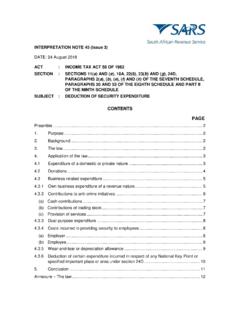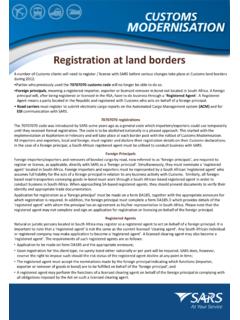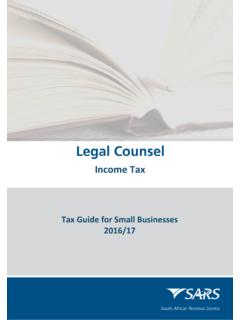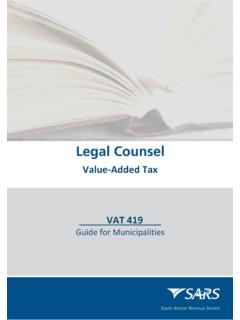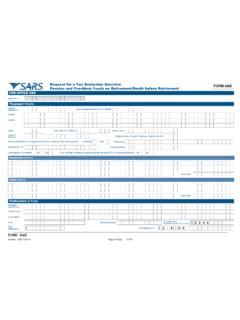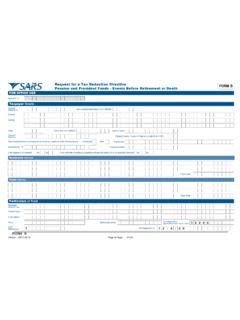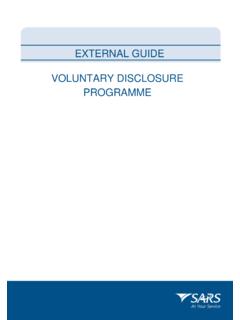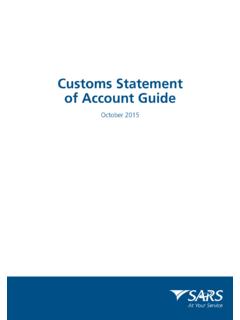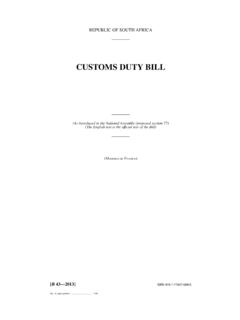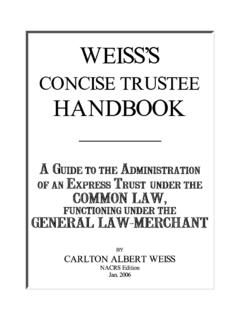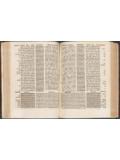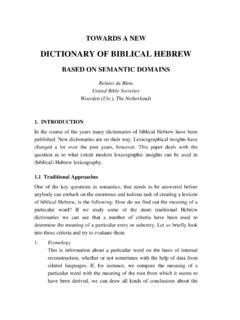Transcription of INTERPRETATION NOTE: NO. 28 (Issue 2) - SARS Home
1 INTERPRETATION NOTE: NO. 28 ( issue 2) DATE: 15 March 2011 ACT : INCOME TAX ACT NO. 58 OF 1962 (the Act) SECTION : SECTIONS 11(a), 11(d), 23(b) AND 23(m) SUBJECT : DEDUCTIONS OF HOME OFFICE EXPENSES INCURRED BY PERSONS IN EMPLOYMENT OR PERSONS HOLDING AN OFFICE Preamble References to sections are to sections of the Act, unless otherwise stated. 1. Purpose This Note provides clarity on the deductibility of home office expenses incurred by persons in employment or persons holding an office. This update incorporates the changes made, in terms of section 37(1)(c) of the Revenue Laws Amendment Act No. 60 of 2008, to section 23(m). 2. Background Expenses in maintaining a home office have been a controversial issue since the judgment handed down in KBI v Van der The legislation relating to home office expenditure that a taxpayer may claim has been periodically amended since 1990.
2 The most recent amendment to have an effect on the deduction of home office expenditure was the amendment to section 23(m). Section 23(m) prohibits, subject to specific exceptions, the deduction of certain expenditure, losses and allowances that relate to employment or the holding of an office. For a detailed discussion on the operation of section 23(m), see INTERPRETATION Note No. 13 ( issue 3) dated 15 March 2011: Deductions: Limitation of Deductions for Employees and Office Holders . The effect of this section on the deductibility of home office expenditure is the topic of this Note. 3. The law For ease of reference, the relevant sections of the Act are quoted in Annexure C.
3 1 48 SATC 104, 1986 (4) SA 303 (T). 2 4. Application of the law on the deductibility of home office expenses What constitutes home office expenditure? Typically, home office expenditure will be the type of expense referred to in section 23(b), namely rent of the premises; interest on bond; cost of repairs to the premises; and other expenses in connection with the premises. In addition to these expenses, other typical home office expenditure may include phones; stationery; rates and taxes; cleaning; office equipment; and wear-and-tear. The general rule The deductibility of expenses relating to a home office is determined by reference to section 11, in particular paragraphs (a), (d) and (e), read together with sections 23(b) and 23(m).
4 This means that for a home office expense to be deductible the requirements of sections 11, 23(b) and 23(m) must all be met. Requirements of section 11 It is not difficult to show that a home office expense meets the requirements of section 11, provided the expense is not of a capital nature. Expenditure such as maintenance, rates and taxes and wear-and-tear on office equipment would usually satisfy the requirements of section 11. Section 11, in so far as it relates to home office expenses, draws no distinction between taxpayers in employment, taxpayers that are holding an office or other taxpayers.
5 Requirements of section 23(m) Section 23(m) is applicable if the taxpayer is in receipt of remuneration derived from employment or the holding of an office, unless the remuneration is derived mainly from commission based on sales or turnover (for more details see INTERPRETATION Note No. 13). Deductions available to the taxpayer are limited under section 23(m) to the deductions listed in this section. As far as home office expenses are concerned, the taxpayer will only be able to claim rental, repairs and expenses incurred in relation to a dwelling house or domestic premises under sections 11(a) and (d) and wear-and-tear allowances under section 11(e).
6 3 Requirements of section 23(b) An expense must still meet the requirements of section 23(b) even though it meets the requirements of section 11 and is allowed under section 23(m). The requirements of section 23(b) are as follows: The part of the home in respect of which a claim is submitted must be occupied for purposes of a trade , as defined in section 1. The part that is so occupied must be specifically equipped for purposes of the trade. The Collins English Dictionary2 defines specific to mean relating to a specified or particular thing and equip to mean to furnish with.
7 The Concise Oxford English Dictionary3 defines specific as relating uniquely to a particular subject and equip to mean supply with the items needed for a particular purpose . It is clear from these definitions that, in order for a part of a private home to be considered specifically equipped for the purposes of trade, that part must be fitted with the instruments, tools and equipment required to conduct that trade. For example, taxpayers who meet clients at their homes would not be permitted a deduction under this head if they meet their clients in their dining or sitting rooms. A separate office would need to be equipped and maintained.
8 An office that requires specialised equipment, such as a mechanic s tools, an architect s drawing board or a doctor s examination room equipment, must be equipped with these items. The part must be regularly and exclusively used for purposes of the trade. The Concise Oxford Dictionary4 defines regularly to mean done or happening frequently and exclusively to mean excluding or not admitting other things; excluding all but what is specified . It is not possible to define what would be acceptable to SARS as regular usage for the purposes of trade, as each case will have to be judged on its own merits. However, a home office that is maintained and is only used occasionally, for example, once on a weekend due to the taxpayer maintaining separate business premises, is not used frequently enough to constitute regular use.
9 As regards the requirement of exclusivity, it is considered that this provision contemplates that the part used for trade may not be used for any other purpose other than the taxpayer s trade. A deduction is not permitted where it is evident that the taxpayer conducts any activities of a private nature in the part used for trade, such as permitting children to use the room as a play room. If the trade is employment or the holding of an office the income derived from this trade must be mainly (that is, must exceed 50% of total income from employment or office) commission or other variable payments which are based on the taxpayer s work 2 Collins English Dictionary.
10 3rd ed. Glasgow: Harper Collins, 1991. Print. 3 Concise Oxford English Dictionary. Edited by Catherine Soanes, Angus Stevenson. 11th ed. rev. New York: Oxford University Press, 2006. 4 Above. 4 performance, and the taxpayer s duties were not performed mainly in an office provided by his or her employer; or the taxpayer s duties must be performed mainly (more than 50%) in that part of the private premises occupied for purposes of trade. Employees who do not earn commission but who spend the majority of their time on the road visiting clients perform their duties mainly at their clients premises and as a result they do not qualify for a deduction under section 23(b).
